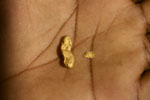
GOMA, Democratic Republic of Congo — The media blackout surrounding the recent incident linking Congo army commander and wanted war criminal Bosco Ntaganda to a gold smuggling operation and $1 million in counterfeit bills has enabled him to try to dictate the narrative. (Read Part 1 for more details about the incident.) Ntaganda now claims that he is a “hero” who uncovered the gold smuggling operation. Since no one has heard directly from the crew members on the plane that landed in Goma earlier this month, the commander’s storyline is viewed here in eastern Congo as an attempt by the Rwandan government to try to clear their ally of wrongdoing.
For now, Ntaganda’s story isn’t being challenged. President Kabila hasn’t spoken out about the scandal and probably won’t unless Kigali gives him the go-ahead.
However, it is well known that Ntaganda’s bodyguards delivered at least 457 kilos of gold to the plane waiting at the airport, in exchange for $6.8 million. The gold for the deal mainly came from the commander’s personal mines in Ituri, while another portion came from Numbi (around Nyabibwe), Itebero, and Omate gold mines in Walikale, according to Enough sources. As a comparison, Ituri district gold exports for 2010 only amounted to 105 kilos from two gold trading houses (“comptoirs”), according to Ituri economy commissioner, speaking to the U.N.’s Radio Okapi last week.
As the Enough field dispatch “Behind the Ban” showed, Congolese army has taken over mines once controlled by Rwandan Hutu militants, and past and present military efforts to dismantle the FDLR have turned out to be a windfall for army officers who indulge in the lion’s share of the conflict minerals. Even as this post was being finalized, the North Kivu provincial mining minister announced that border police at Goma airport had seized nearly a ton of tin. The minister would not release the name of the owner because the shipment belonged to Congolese army officers.
Congo is one of the most resource-rich countries on the planet, but its minerals have brought little benefit and much grief to its people. Natural resources including a wide range of strategic minerals such as uranium, radium, cobalt, copper, tin, tantalum, gold, and others have been at the heart of regional and international scramble resulting in ongoing conflict and even allegations of genocides for almost two centuries now since King Leopold II grabbed hold of Congo and its people in 1834.
Following significant international attention on the conflict minerals trade, the U.S. Congress passed the conflict minerals provision within the recent Dodd-Frank Wall Street Reform Act, and Congolese President Joseph Kabila declared on September 9, 2010 a ban on minerals exports in three eastern Congo provinces (North Kivu, South Kivu and Maniema) to curb what he referred to as “a kind of mafia involving dubious businesspersons, military officers and administrative agents.”
Paradoxically, although it appeared that Kabila was using this opportunity as an attempt to crack down on CNDP elements – of which Ntaganda is a leader – that were ordered to be redeployed outside of the Kivus, the imposition of the ban has actually served to increase CNDP control of mining in the region. For example, miners from the Rubaya area of Masisi territory have told Enough that ex-CNDP officers have taken control of mines previously operated by civilians. Hundreds of miners from Rubaya and neighboring villages have been forced to work in the mines on behalf of the military units in a food-for-work arrangement. The minerals are smuggled in food shipments or transported by military vehicles to Goma, undergo a rough initial processing, and are then smuggled to Rwanda. Rwanda officially suspended its own mineral exports roughly concurrently with the Congolese export ban, claiming that heavy rains had flooded Rwanda’s own mines. This suggests that Rwanda may be stockpiling large quantities of minerals, or that they don’t want to let on how much of their mineral shipments actually come from Congo.
Despite the fact that Joseph Kabila has presided over the country for five years as conflict rages on in the East and Congo fails to shake its reputation for a dysfunctional government and national army, the president is determined to win upcoming elections at all costs. During his annual speeches to the nation, the president has declared war against institutionalized corruption and impunity, but such a policy has revealed to be hollow, events in this post show. People in eastern Congo, for example, equate the “ban” with Kabila’s earlier “zero tolerance” policy for sexual violence; both measures quickly became known as “Zero tolerance, zero consequence!”
Congo has been called “the rape capital of the world;” it also could be dubbed the world capital of corruption and impunity for the persistent failure of the government to hold perpetrators accountable. Moreover, some of the most egregious perpetrators come from within the ranks of the government’s own army or civil service, and it is this group that is benefiting most from the mining ban. Far from enabling the government to regulate the trade, the “ban” has created an extra layer of opaqueness.
Photo: Gold nugget in the hand of a miner in eastern Congo (Enough/Sasha Lezhnev)

